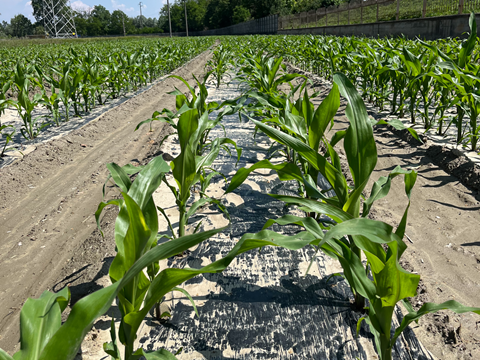
Sirmax Group’s certified biodegradable plastic mulching films have reportedly lowered micro-bioplastic concentration in agricultural soil during open-field testing with the University of Turin.
Mulching films are used to control weed growth in orchards, vineyards, and vegetable gardens. Sirmax has manufactured its film with BioComp, a material certified as ‘Biodegradable Soil’ under EN 17033:2018-3.
To complement this laboratory certification with real-world knowledge, Sirmax joined forces with the University of Turin and conducted open-field studies at its experimental centre in Carmagnola.
The research project compared the behaviour of multiple biodegradable plastic mulching films in agricultural soils, applying the materials to corn crops over the course of a year to weigh up their performance and potential impact on production in an independent scientific setting.
By the end of the study period, Sirmax claims that its mulching film successfully controlled weed growth throughout the entire crop cycle – reporting ‘no significant differences’ in yield between mulched corn, chemically weeded corn, and non-mulched corn.
Apparently, analyses of the soil also revealed a decrease in micro-bioplastic concentration in the six months after harvest. This suggests that the film could potentially biodegrade completely without detrimental impacts on the environment, but another round of testing has been scheduled later in the year to solidify these findings.
“This project was conceived with the goal of providing scientific backing for a product that can genuinely contribute to more responsible management of natural resources in agriculture,” explains Alberto Zanon, head of the BioComp division at Sirmax Group. “It offers an alternative to traditional plastics used in this sector, providing benefits by reducing soil pollution and minimizing the production of waste that is difficult to dispose of.
“We are proud of the results achieved in this study because it demonstrates that Sirmax can compete in the sector by offering a biodegradable product that meets the performance requirements of its intended application.”
Francesco Ferrero, scientific lead of the project at the University of Turin, adds: “The work we conducted with four departments at the University of Turin (Agricultural Sciences, Chemistry, Biology, and Veterinary Medicine), in partnership with Sirmax, was aimed at studying the behavior of biodegradable plastics used for mulching corn, with a focus on the recovery of micro-bioplastics (MBP) in the soil, microbial biodiversity, soil functionality, and agronomic performance.
“The collaboration between Sirmax and the University of Turin serves as an exemplary model of synergy between industry and academic research, dedicated to developing innovative and sustainable solutions.”
A similar development from Aran utilizes a high-barrier bag to capture biogas from agricultural waste fermentation and transport renewable energy to households with limited access to traditional energy sources. The solution is designed for HomeBiogas systems and reportedly prevents greenhouse gases from leaching into groundwater or escaping into the atmosphere.
We recently sat down with PreScouter’s marketing director, Mariam Jomha, to learn more about the roles of fermentation chemicals in bioplastic production. Fermentation processes are said to be more expensive than traditional chemical production, which affects bioplastics’ competitiveness with fossil-based alternatives; but technological advancements and regulatory support could reportedly bolster the scalability of, and market demand for, PLA and PHA.
If you liked this story, you might also enjoy:
Reuse vs. single use – which is better for the environment?
Sustainable Innovation Report 2025: Current trends and future priorities
What can the world learn from South Korea’s world-leading performance in plastics circularity?














No comments yet